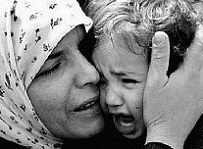 Poppycock – or why remembrance rituals make me see red
Poppycock – or why remembrance rituals make me see red
Robert Fisk: The poppy helps us avoid a search for the meaning of war ■ I know all the reasons they give us. We must remember our dead. “They” died for us and our freedom. The cost of sacrifice. Remember Passchendaele. Never forget. At school I used to wear a poppy – without the leaf which now prettifies this wretched flower – and so did my Dad who, as I often recall, was a soldier of that Great War, in the trenches of the Third Battle of the Somme, 1918, and at Cambrai. But then, as 2nd Lieutenant Bill Fisk grew older and became sick, he read the biographies of that most meretricious of officers, Earl Haig – butcher Haig of the Somme, whose wife gave her name to the original poppies – and came to regard the wearing of these sickly and fake petals as hypocrisy. He stopped wearing the poppy for 11 November, and so did I. ● At Ypres four years ago, I was honoured to give the Armistice Day lecture just before 11 November; but I did not wear a poppy and politely declined to lay a wreath at the Menin Gate – that “sepulchre of crime” as Sassoon called it – and I discovered, as the clergy purred away beneath the names of the 54,896 Great War soldiers with no known grave, a headstone atop the city’s old medieval wall. Nothing could equal the words which his family had courageously inscribed above the final resting place of 2nd Lieutenant Arthur Conway Young, who died on 16 August, 1917: “Sacrifice to the fallacy that war can end.”




